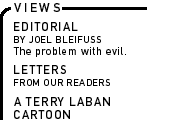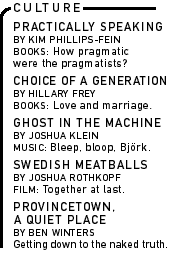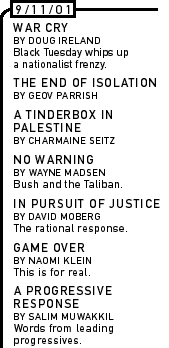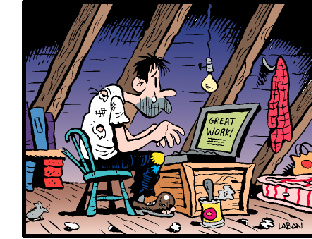|
|

|

|

|
|
|
| |
|
|
|
Thin Blue Line 7.2 Two sheriff's deputies from rural Maryland are breaking new ground in the field of frivolous litigation. They're suing an innocent motorist they beat the hell out of three years ago. Frederick T. Moore IV was driving erratically, Geov Parrish reports on Workingforchange.com, when a Frederick County patrol car picked up his trail. Moore failed at first to pull over. Then, when he did stop at a roadblock police had set for him, he failed to respond to their commands. In short order, deputies Eric J. Winer and Jeffrey A. Norris had pepper-sprayed Moore, wailed on him with nightsticks and unleashed a dog into the cab of his pickup. Only then did they notice a sign dangling from Moore's rearview mirror identifying him as a diabetic. Moore, it turns out, had been on the verge of a diabetic coma. No criminal charges were filed in connection with the case, but, after a four-day stay in the hospital, Moore filed a $10 million lawsuit in federal court. Now Winer and Norris are a little hurt, frankly, by the way Moore has been squalling to the press. After all, the lawmen claim in a suit filed in U.S. District Court, they saved him from "serious harm, injury and/or death." They're seeking $68,000 in damages.
Grub Street Blues 4.9 Pity the poor scribblers. According to a report published by the National Writers
According to the report (which can be found at www.nwu.org), a freelancer can expect to churn out between 3,000 and 4,000 published words a month, the equivalent of two feature articles. Even a prolific writer, if paid 30 cents a word--the low end of the New York Times freelance scale, according to the NWU--could expect to make only $14,400 a year (even less if you take expenses into account). Of course, writers favored with the Times' high-end buck-a-word rate won't qualify for food stamps. They will, however, still fall short of the median income of full-time, college-educated workers in the United States. So how do writers manage to cough up content, especially for alternative
weeklies and, ahem, lefty magazines that offer a fraction of the
aforementioned rates? Because rent's not so bad here in Bangladesh,
actually, and because we love you.
|







